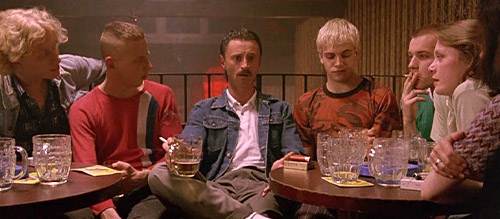‘Trainspotting’ at 25 – Review
Trainspotting (1996)
Director: Danny Boyle
Screenwriters: John Hodge
Starring: Ewan McGregor, Ewen Bremner, Jonny Lee Miller,
Kevin McKidd, Robert Carlyle, Kelly Macdonald
Trainspotting. The quintessential Scottish film. By definition, a British picture, but at its beating heart it is truly a Scottish movie. The small film from the small country that became one of the most famous films of all time.
It is easy to see why Trainspotting is so cherished. Braveheart dominated the box office in 1995 and swept the 68th Academy Awards, receiving the most nominations that year and winning the most awards on the night, presenting an overly Hollywood-ised portrayal of Scottish history. Trainspotting would be released a year later, kicking down tinsel-town’s doors and presenting a painfully realistic look at modern day Scotland, the capital of which was considered the AIDS capital of Europe at the time.
Although Trainspotting follows a group of Heroin addicts navigating themselves from one hit to another through the economically depressed and AIDS-riddled Edinburgh of the time, the movie is incredibly fun. In large part this is due to the point of view through which the events of the film are shown: through the eyes of Mark Renton. It is this point of view that injects such high levels of entertainment – as a heroin addict, the drug provides the highest of highs to Renton (or as he puts it “take the best orgasm you ever had, multiply it by a thousand and you’re still nowhere near it”), yet Renton is aware of the incredible lows that such a drug can cause, and so both feelings are present in all aspects of the filmmaking. Trainspotting is, in this way, a perfect cocktail of immense pleasure and entertainment blended with some of the most disturbing images ever put to screen; a cocktail which is mixed by the masterful scriptwriting of John Hodge, the hyperactive editing style of Masahiro Hirakubo, and the fast paced and era-appropriate direction of Danny Boyle.
Despite Trainspotting only being Boyle’s second feature film, the would-be Oscar winner directs the movie masterfully, arguably hitting his art-house-inspired peak with this 1996 release. Every aspect of the film seems meticulously orchestrated by the director, Trainspotting being a flawlessly paced ninety-five minutes of excellence. Perhaps most impressive, however, is his ability to blend pop culture into his disturbing and evolving world, as well as his perfection of the needle drop. Although both feats had been achieved previously in the works of Scorsese, Tarantino and Linklater, Trainspotting offers possibly the most widely renowned and most satisfying blend. Although Boyle’s brilliant needle drop on Iggy Pop’s “Lust for Life” is the most famous example, creating one of the best character introductions ever as well as one of the greatest film openings ever, it is the transition from Heaven 17’s “Temptation” to Sleeper’s “Atomic” that is possibly Trainspotting’s greatest example, using one simple guitar riff to create one of the best character introductions of all time for Kelly Macdonald’s Diane.
Danny Boyle’s fantastic direction not only kickstarted his own career but also skyrocketed everyone involved into superstardom, with Ewan McGregor most notably being cast as Obi-Wan Kenobi in George Lucas’ 1999 Star Wars prequel The Phantom Menace. It is easy to see why everyone’s careers lifted off after the release of the film. Although Boyle’’s direction was excellent, and Hodge’s script (plus Irvine Welsh’s original novel) supplied the actors with excellent material to work with, it could only get them so far. Each actor gives the best performances of their careers in Trainspotting, transforming into their characters to such an extent that their performances remain completely unrecognisable even after their fame, all working together to craft a group of friends that, in spite of their lifestyles, you wish you could stay with beyond the credits.
Trainspotting has surpassed simply being a great film, it has left behind an indelible legacy that allows it to be remembered just as fondly twenty five years later. Although the movie portrayed a Scotland of the time, it still speaks volumes; an accurate representation of the country, its people and their attitudes (“It’s shite being Scottish!”). More importantly, however, Trainspotting has entertained and inspired many over the years. Although it has produced its fair share of cringe-inducing copycats, it has also inspired filmmakers all over the world with its seducing blend of contradictory elements that should not work together yet somehow do.
Trainspotting is, simply put, a masterpiece; a film that is sure to be remembered as such for another twenty five years and possibly even longer. If you have never seen Trainspotting, stop what you are doing and go out of your way to watch it right this second.
24/24
Recommended for you: T2 Trainspotting (2017) Review


